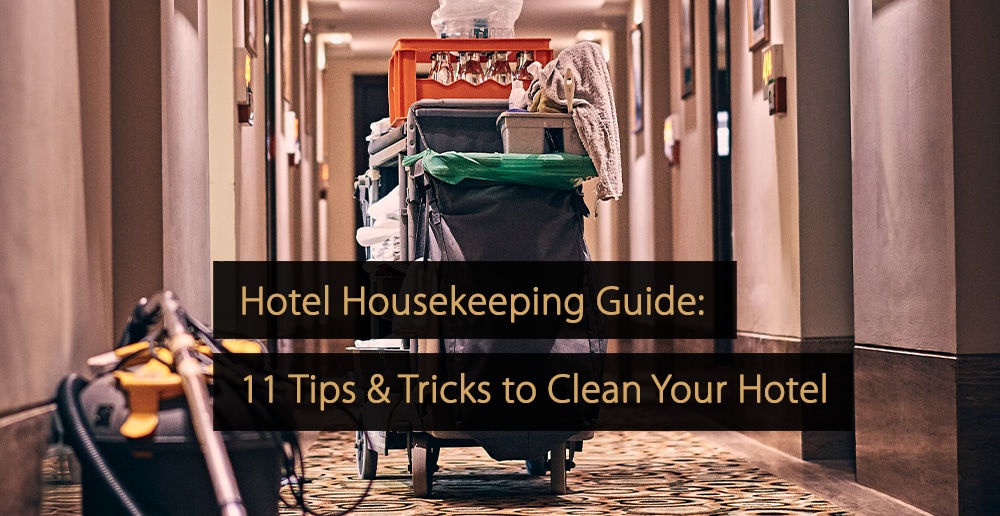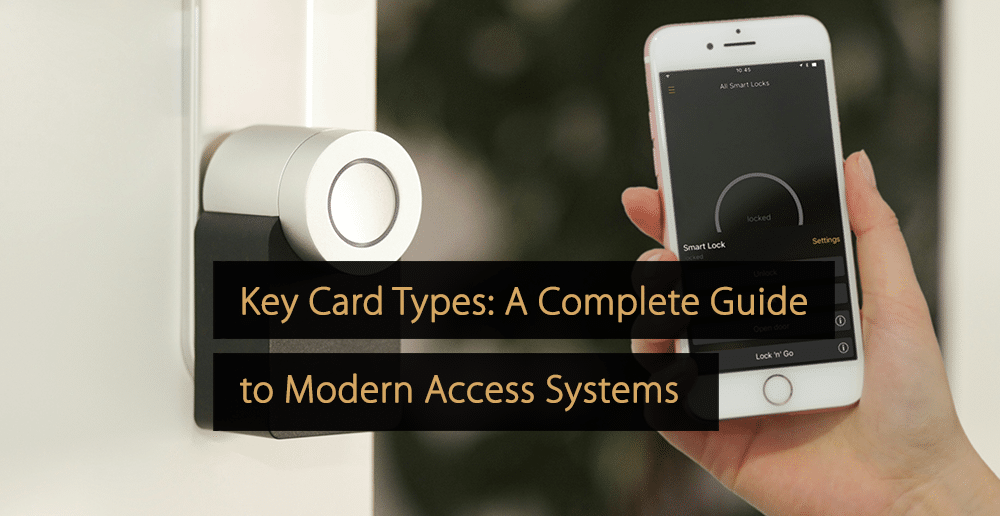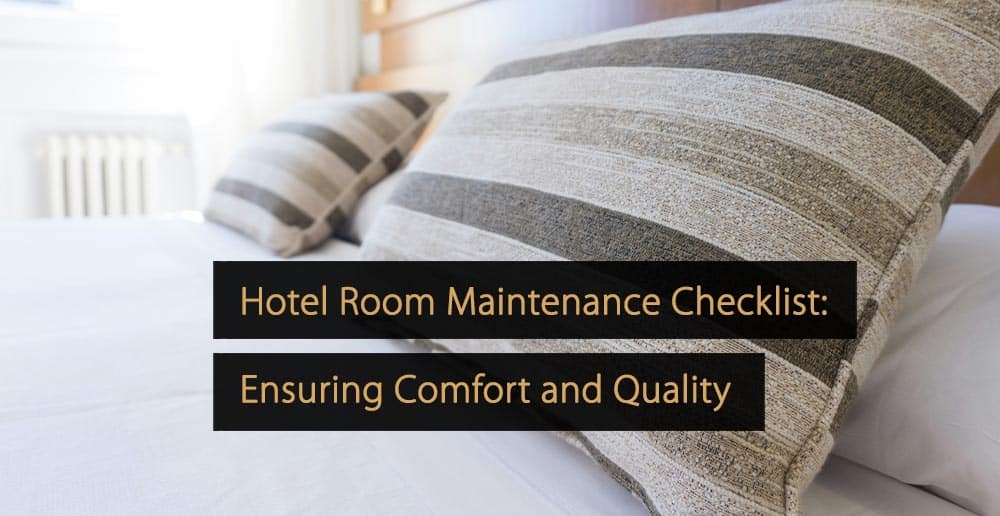Hotel housekeeping is one of the most important elements of customer service because all guests want to stay in a clean, tidy, comfortable, aesthetically appealing hotel that is organized or arranged appropriately. In this article, you can learn some tricks and strategies for keeping your hotel just as guests like it.
Table of Contents:
- What is Hotel Housekeeping?
- Devising a Hotel Housekeeping Strategy
- Using Your Hotel PMS for Housekeeping
- Housekeeping Trolley: The Most Crucial Tool of the Hotel Housekeeper
- 11 Tips & Tricks to Make Sure Your Hotel is Clean
- 1. Plan Properly Before Starting Operations
- 2. Utilize Digital Hotel Housekeeping Checklists
- 3. Move to Eco-Friendly Products to Improve Sustainability
- 4. Optimize and Automate Your Housekeeping Schedule
- 5. Ensure Housekeeping Communication is Strong
- 6. Address Housekeeping Problems and Identify Patterns
- 7. Pay Special Attention to the Furniture
- 8. Train Your Staff to Continuously Uphold Standards
- 9. Use Creative Solutions to Optimize Operations
- 10. Keep an Eye on Your Laundry Equipment
- 11. Provide Staff With Pest Awareness Training
- Effects of COVID-19 on Hotel Housekeeping
- Hotel Housekeeping and PMS Software
- Hotel Housekeeping and Hotel Software Solutions
- Hotel Housekeeping and COVID-19
What is Hotel Housekeeping?
First, it is worth taking the time to define and explain hotel housekeeping. Essentially, this refers to keeping a hotel clean, tidy, comfortable, safe, and visually appealing. Some of the major activities will involve cleaning surfaces, removing litter, waste, and other debris, changing sheets, and maintaining orderliness.
Hotel housekeeping is important because guests do not want to stay in hotels that are untidy, dirty, unhygienic, or badly maintained in other ways. Beds should be freshly made up for new arrivals, rooms should be organized logically, the hotel should be presentable, and hazards and health risks should be eliminated.
Although most hotels will have dedicated housekeeping staff, and their primary responsibilities will involve cleaning the hotel and preparing rooms for guests, it is important to understand that housekeeping is the responsibility of all staff, because everyone should be contributing to providing a clean and safe environment.
Video: Housekeeping Department In Hotels
Devising a Hotel Housekeeping Strategy
To get the most from your hotel housekeeping department, it is essential to devise an effective strategy. A significant part of this will involve learning how much work housekeeping staff can do so that you can always have an appropriate number of employees working in the department at any given time.
The precise number of hotel housekeeping staff you need per shift will depend on the amount of work needed. This, in turn, will depend on the number of rooms within your hotel, the number of rooms that need to be cleaned and prepared for new guests, and the amount of cleaning work required around the rest of the hotel.
One of the best hotel housekeeping tips is calculating the average time your housekeeping staff requires to completely clean and prepare a hotel room. From there, you can calculate roughly how many rooms can be completed within a shift, which will help you determine how many staff members you need to work a particular shift.
Using Your Hotel PMS for Housekeeping
A hotel property management system, or PMS, is one of the most important examples of hotel technology. Essentially, these software packages are all-in-one solutions for hotels, allowing users to control reservations, front desk operations, distribution, revenue management, and other tasks from a single location.
The best hotel PMS options on the market will also provide housekeeping options, allowing the core hotel housekeeping tasks to be managed through the platform. This may include employee scheduling and an option to track the current status of each room in the hotel, such as whether they are occupied, empty, or in need of cleaning.
From there, one of the best hotel housekeeping tips is to use your hotel PMS to assign tasks to the housekeeping staff based on the needs of your hotel and guests. Modern solutions may also allow mobile phones or tablets to connect to the PMS, allowing housekeeping staff to update their progress as they work through tasks.
Housekeeping Trolley: The Most Crucial Tool of the Hotel Housekeeper
Another of the most crucial hotel housekeeping tips involves providing housekeeping staff with a trolley. This is perhaps the most essential tool for hotel housekeeping employees because it ensures they have all the tools they need to perform their role effectively. Nevertheless, your housekeeping trolley needs to be carefully managed.
In particular, finding the ideal balance in providing the necessary equipment is important. Examples include bed sheets, cleaning equipment, towels, toiletries, and other items used within hotel rooms.
Staff will need to manage their trolley as they progress through their shift, and this may mean taking time the re-supply the trolley after they have cleaned and prepared a certain number of hotel rooms. It is also important that the trolley is well maintained, safe to use, and never over-supplied to the point where it becomes difficult to push.
11 Tips & Tricks to Make Sure Your Hotel is Clean
In the sections below, you can access some useful hotel housekeeping tips to help you organize your housekeeping staff, manage operations, and ensure your hotel is clean, safe, and visually appealing.
1. Plan Properly Before Starting Operations
In truth, the key to all good hotel housekeeping practices is careful planning. Your housekeeping department must continually track what needs to be done and when that work must be carried out.
Cleaning supplies and other housekeeping equipment will need to be managed carefully. New supplies must be ordered before the housekeeping staff runs out of towels, sheets, toilet paper, and cleaning equipment. Supplies should also be prepared and stocked logically so that housekeeping staff know where to find everything.
Once housekeeping staff arrives at the workplace, they should be able to access their daily tasks and get to work as soon as possible. Some hotel trends, such as adopting hotel robots, are also helping housekeeping departments ensure that some more predictable and repetitive tasks are carried out before staff arrive.
2. Utilize Digital Hotel Housekeeping Checklists
For hotel housekeeping departments, efficiency is a top priority, and the best way to optimize efficiency is to plan out what needs to be done and then continually track progress. While this has traditionally been done using notepads or printouts, hotel housekeeping checklists have moved into the digital sphere.
Digital checklists offer many advantages, including updating information in real-time for everyone with access. Housekeeping staff can use portable devices to indicate when a task has been completed and who completed it. This then results in greater transparency, less confusion, and fewer errors.
3. Move to Eco-Friendly Products to Improve Sustainability
Issues surrounding sustainability and eco-friendliness are increasingly important to customers, and those in the hotel industry are under greater pressure than ever to act responsibly and limit the negative effects of the travel and tourism industry on local communities and the environment.
Again, a balance needs to be struck here, especially in a post-COVID world, where guests are likely to be more aware of hygiene issues. However, harsh chemicals can often be substituted with more eco-friendly alternatives, which still provide the same benefits, and hotel toiletries can also emphasize sustainability.
4. Optimize and Automate Your Housekeeping Schedule
Your hotel housekeeping schedule is essential to overall performance, but it needs to be optimized. For instance, if you have too many employees working a shift, you risk paying people who are not contributing anything useful to the hotel. If you have too few staff working a shift, you risk important work not being completed.
The key to optimizing a schedule is to use the available data. How long does a room take to clean and prepare? How many employees are needed when occupancy is at a certain level? All of this information should be available in your PMS, or other software, and the best solutions will also allow schedules to be automated based on this data.
5. Ensure Housekeeping Communication is Strong
The communication skills of hotel housekeeping staff is another area that you should continually work on, as it can have a significant bearing on performance. Internal communication, for example, is how employees will know what to do and when, and the team needs to be organized effectively to achieve the best outcomes.
Communication skills include written communication, in-person verbal communication, and communication via telephone and digital channels. In addition, housekeeping staff also need to develop customer service skills because there are likely to be instances where they come into direct contact with guests in the hotel.
6. Address Housekeeping Problems and Identify Patterns
Next, those in housekeeping and wider hotel management positions must take the time to identify housekeeping problems, track any guest complaints, and try to find patterns or trends.
At times, individual housekeeping staff may make mistakes or overlook a particular task, which may result in a guest complaining or requesting that action be carried out. However, common issues or complaints can indicate wider issues with housekeeping processes that may need to be addressed.
7. Pay Special Attention to the Furniture
The furniture plays a pivotal role in shaping the guest experience within the hotel. However, hotel housekeeping staff must pay particular attention to the furniture in guest rooms and communal spaces to prevent guests from developing negative opinions and other issues.
Aside from more obvious tasks, like changing the sheets on beds, housekeeping staff need to vacuum and otherwise clean sofas, chairs, tables, and other furniture to look presentable. Failure to keep furniture clean and correctly positioned can lead to customer displeasure, allergies, and even safety concerns.
8. Train Your Staff to Continuously Uphold Standards
Those working in the hotel industry need to establish high standards so that customers enjoy spending time in their rooms and communal areas and feel comfortable and safe doing so. Once these standards have been set, it is also important that they are not allowed to slip.
To achieve this, hotel housekeeping staff need to be trained to understand what those standards are and to uphold those standards continually. Housekeeping staff should take pride in the hotel and be equipped to resolve problems quickly, take steps to prevent problems from arising, and respond to customer requests quickly and politely.
9. Use Creative Solutions to Optimize Operations
One of the best hotel housekeeping tips is never to allow yourself to become fully satisfied with your current performance. There will always be ways to improve housekeeping practices, and you should be open to trying new approaches and finding creative solutions that will allow you to optimize operations.
Monitor performance and try to identify areas for improvement. Use digital technology to optimize efficiency and scheduling. Try to develop routines that allow you to wash full loads and maximize energy efficiency. Invest in tools that can automate some more repetitive or predictable operations so that staff can focus on complex tasks.
10. Keep an Eye on Your Laundry Equipment
Many common hotel housekeeping operations rely on specific equipment, such as washing machines and dryers. Therefore, to optimize your housekeeping department, you need to keep a close eye on this equipment.
Regular maintenance can be important for detecting small issues, which might become more significant problems if they are left too long. Additionally, hotels need to know when repairs need to be made. Of course, in some cases, investing in new equipment to replace broken or aging machines is going to be better and more cost-effective.
11. Provide Staff With Pest Awareness Training
Finally, a hotel’s reputation can be damaged severely if certain pests become a problem. No hotel guest wants to see cockroaches, mice, and rats, so housekeeping staff needs to be provided with training that can help to deter these pests, and much of this training will emphasize cleanliness, tidiness, and good hygiene practices.
Dispose of waste quickly, consistently, and using hygienic methods. Avoid leaving unsealed food lying around. Inspect the hotel regularly for nests. Take swift action if a pest problem arises and prevent it from worsening. Insects may also be attracted to plants, so be careful with where you place them and consider using realistic fake plants.
Effects of COVID-19 on Hotel Housekeeping
The COVID-19 pandemic disrupted the entire hotel industry, but hotel housekeeping is an area that was especially impacted. After all, the pandemic made customers more aware of hygiene issues than ever. At the same time, it altered customer expectations regarding the amount of direct contact they wanted with staff.
As the world has adapted to the presence of coronavirus, and as vaccines have helped the hotel industry to return to some degree of normality, housekeeping departments have to try to ascertain which changes in customer behavior were temporary and only relevant at the height of the pandemic, and which changes are here to stay.
In general, the extra focus on hygiene, cleanliness, and the transmission of germs is likely to stay, which means housekeeping has become a more important part of the customer experience than ever before. Surfaces need to be kept clean, while hand gel may still be desirable for the foreseeable future.
However, some other changes in expectations are likely to depend on the virus levels present within a particular location, as well as on local rules and regulations at the time of a guest’s visit. Direct contact with housekeeping staff may need to be limited at times when levels of transmission are high, for instance.
Hotel Housekeeping and PMS Software
Your property management system, or PMS, will play an integral role in not only your hotel housekeeping efforts but various other aspects of your hotel, including bookings, check-ins, and marketing. Therefore, ensuring your PMS can provide integration options with other software solutions, you may be using is important.
Check out “PMS Software: Which Software Integration Should a PMS Have?” for more information on property management systems and the most valuable software integrations for hotels.
Hotel Housekeeping and Hotel Software Solutions
While PMS software is valuable for hotel housekeeping, it is not the only software that may be relevant to hotel leaders. Some other solutions that will be worth investing in may include revenue management software, reputation management software, a hotel distribution channel manager, and more.
Read “5 Hotel Management Software Solutions Every Hotel Needs” to find out more about some of the most significant software solutions on the market and explore how they can help business leaders in the hotel industry.
Hotel Housekeeping and COVID-19
The COVID-19 pandemic caused major disruption for the hotel industry, and the future remains uncertain regarding how much coronavirus could affect hotels and their guests. It is sensible for hotels to take precautions, optimize hygiene measures, provide the right training for employees, and communicate with guests effectively.
Take a look at “Tips for Hotels During the Corona (COVID-19) Crisis” for more information on some of the steps hotels can take to contend with the COVID-19 pandemic, protect revenue streams, and optimize the guest experience.
Hotel housekeeping is one of the most important components of a pleasant guest experience because your guests want to know they are staying in a hotel that values cleanliness and tidiness. The hotel housekeeping tips should help you keep your hotel hygienic, well-organized, and always presentable.
Would you Like to Learn More About Housekeeping?
You might also be interested in the following articles:
- Housekeeping Technology; The Latest Tech used in Hotel Housekeeping
- Housekeeping Department in Hotel Businesses: Why Is It So Important?
- Housekeeping Duties: 8 Main Responsibilities of a Room Attendant
- Housekeeping Responsibilities: Learn About the Hotel Cleaning Tasks
- Discover The Latest Housekeeping Trends
- Hotel Room Maintenance Checklist: Ensuring Comfort and Quality
More Tips to Grow Your Business
Revfine.com is the leading knowledge platform for the hospitality and travel industry. Professionals use our insights, strategies, and actionable tips to get inspired, optimize revenue, innovate processes, and improve customer experience.Explore expert advice on management, marketing, revenue management, operations, software, and technology in our dedicated Hotel, Hospitality, and Travel & Tourism categories.
This article is written by:
Hi, I am Martijn Barten, founder of Revfine.com. With 20 years of experience in the hospitality industry, I specialize in optimizing revenue by combining revenue management with marketing strategies. I have successfully developed, implemented, and managed revenue management and marketing strategies for individual properties and multi-property portfolios.









Thanks for sharing these helpful housekeeping tips and tricks for cleaning hotels! I appreciate your comprehensive guide for maintaining a clean and organized hotel, from preparing the cleaning supplies to scheduling regular deep cleans. The emphasis on using eco-friendly cleaning products and implementing sustainable practices is significant today. I think it’s great that you’ve also included tips for training hotel housekeeping staff and encouraging a culture of cleanliness and attention to detail. Thanks again for sharing these valuable housekeeping guidelines! Have you personally worked in the hotel industry and have any additional insights or recommendations to share?